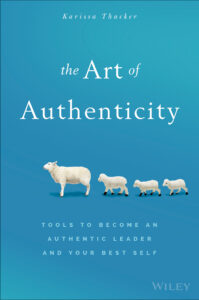The Power of Authenticity
Be yourself. Be true to you. Don’t try to be someone else. Don’t put on false airs. Be authentic.
Most leaders hear this advice but don’t know what it means, what to do about it, or how it impacts everyday life in the office.
Becoming an authentic leader is more than a lofty goal. It’s an essential part of your effectiveness. My own experience is that it’s often authenticity that sets the great leaders apart. We don’t always know why we are inspired by certain individuals, but I think it is this characteristic that appeals to us at a deep level.
To learn more about this subject, I read Karissa Thacker’s terrific new book, The Art of Authenticity: Tools to Become an Authentic Leader and Your Best Self. Karissa is the founder and president of Strategic Performance Solutions. She is a management psychologist, focusing on human performance and satisfaction at work. I recently asked her to share some thoughts about her work on authenticity.
What I particularly like about her new book is that, as the subtitle of the book suggests, she provides tools to help with the goal.
Lead with Authenticity
How would you define authenticity in leadership?
 Both authenticity and leadership are important in defining authentic leadership. Leadership is about getting things done that are both difficult and important in the context of a specific organization or more broadly any human community. Authenticity adds another layer which is being true to your own nature AS you are getting things done that are difficult and important.
Both authenticity and leadership are important in defining authentic leadership. Leadership is about getting things done that are both difficult and important in the context of a specific organization or more broadly any human community. Authenticity adds another layer which is being true to your own nature AS you are getting things done that are difficult and important.
What’s the relationship between authenticity and leadership?
Our typical way of thinking about authenticity is to just be yourself, and it will all turn out better. Of course, be yourself. It sounds so simple. The first problem with that is you are not that simple. We humans are just not that simple. There is no one solid self like a concrete block. Our hardwired adaptive traits as humans mean that we behave differently under different situations and circumstances. Leadership requires this adaptability. But you have to find ways to communicate who you are as you are leading effectively. More importantly, you have to figure out ways to stay in touch with what is important to you as you are in the thick of getting things done. Paying attention to the inner game and outer game at the same time is a lot easier said than done. Said another way, it is easier to just be authentic or just figure out how to get things done that are difficult and important. But the daily question is how do we do both at the same time?
Why do you think there is currently so much interest in leadership authenticity?
Trust in big institutions like our government here in the US is low. I also think that the modern era poses some challenges with upping the ante on aspects of authenticity like transparency. Like it or not, we are in an age of transparency. The boundaries between private life and work or with private life in general are not what they used to be.
Leadership is never a value-neutral concept. To say someone is a leader means we have high expectations. A lot of this interest comes down to people wanting our leaders to step up and make things happen that are good for the whole. Any robust discussion of authenticity takes you fully into the thicket of human moral psychology as authenticity is so not a value-neutral construct.
Jim Carrey’s movie Liar Liar immediately came to mind when I read your Truth Serum Question. Would you share this exercise with us?
Imagine that everyone in your workplace has had a powerful truth serum and everything they think unfiltered will come out of their mouths tomorrow.
I use that question with clients to point out just how impractical the notion of being totally honest all the time is. It is not just impractical but probably harmful and definitely not conducive to maximum productivity. Then we can talk about creating norms and enabling conditions in which honest conversations can happen about things that really matter.
You reference It’s A Wonderful Life in the book with George Bailey questions: (1. What would happen differently in your workplace if you weren’t there? 2. What impact did you have on that conference call, meeting, project today? 3. How would your team be affected if you were absent for a month?). How do the answers to these three questions help inform a leader of his/her strengths and weaknesses?
If you teach yourself to think about those George Bailey questions, you are raising your expectations and not letting your self off the hook. You acknowledge specifics about what you did or did not do that made a difference. With the regular doing, you start to see patterns which are, of course, strengths and weaknesses. You also begin to see how certain situations trigger the best in you and other situations trigger the worst in you.
What techniques work to understand a culture and diagnose where it is in terms of authenticity?
I would need another book for that one!!
A good place to start is with observing the culture as it is. Depending on the size of the company or the way the company is managed, the culture may be weak, meaning that behavior is more variant. But pay attention to the consistencies that are not discussed.
But the big question here is, are people given direct feedback about what is not working? That is such an important signal about how the place functions. It is an important litmus test since we don’t have time for another book today! Let me give you an example. As a coach, I sometimes meet people who have had the same issues for a decade, and no one has told them straight up that they talk too much or come across as arrogant or whatever the issue is. It is challenging to become more authentic as a leader in cultures where it is not normative to have honest dialogue about things that matter.
4 Components of Authenticity
How do leaders encourage a culture of authenticity?
Model it. Do it. There are at least 4 components of authenticity that we know about for sure: self-awareness, unbiased processing, appropriate transparency and staying true to your values. Role model those aspects and talk about your struggles to live up to them all in situations where it is appropriate.
Second, be very careful about how you react when someone makes an honest mistake or misstep. Let’s say someone led a product launch that did not go well. What happens to that person? How are they treated?
Fear is not your friend if you want a culture of authenticity. Fear is helpful in building obedience and conformity but not authenticity.
Hire for Authenticity
When hiring a candidate, what questions should you ask to determine their authenticity?
Tell me about a situation that did not work out well for you or the business. You really have to have conversations below the surface. For example, if a candidate cannot tell you about a time in which an initiative did not go well with some level of insight into what they could have done more effectively, you are probably not dealing with someone capable of unbiased processing, and self-awareness is not showing up at least in that moment. Give several opportunities. Some people are slow to warm up.
Leaders are shaped through experiences. Tell me a story about an experience that has shaped who you are as a leader today. This one is a gold mine. If you get only a surface answer even when probing on this one, you may not have a leader who has built the capacity to learn from experience.
One of the more interesting chapters in the book is titled Followers Beware of Charisma. Charismatic people may be authentic or not. But we often get so carried away by charisma that we assume authenticity. Authentic people may not be charismatic at all. Charismatic people excite and become the focal point in the room. Interviewers need to be especially conscious that they not get carried away by charisma and assume authenticity. Interviewers need to ask themselves, “Is he just charismatic? And also, am I missing an authentic leader because I was hoping for charisma?”
The Art of Authenticity: Tools to Become an Authentic Leader and Your Best Self

